[Exclusive Interview with New College of Management Faculty] Pei-Chi Lo of the Department of Information Management: Broaden your horizons, learn across disciplines, and don’t limit your future career opportunities
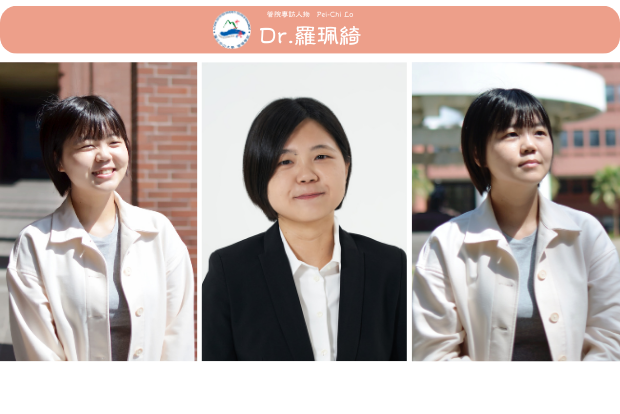
With her baby face, Professor Pei-Chi Lo of the Department of Information Management looks like a youthful student when she walks around NSYSU’s campus.
“I've just finished Frieren: Beyond Journey’s End and Chainsaw Man. I love Dune! I'm looking for the original!” she said, pointing to the framed Dune 2 poster in her research lab. She added that she usually listens to rock music and watches F1 racing, so her interests are similar to those of young people.
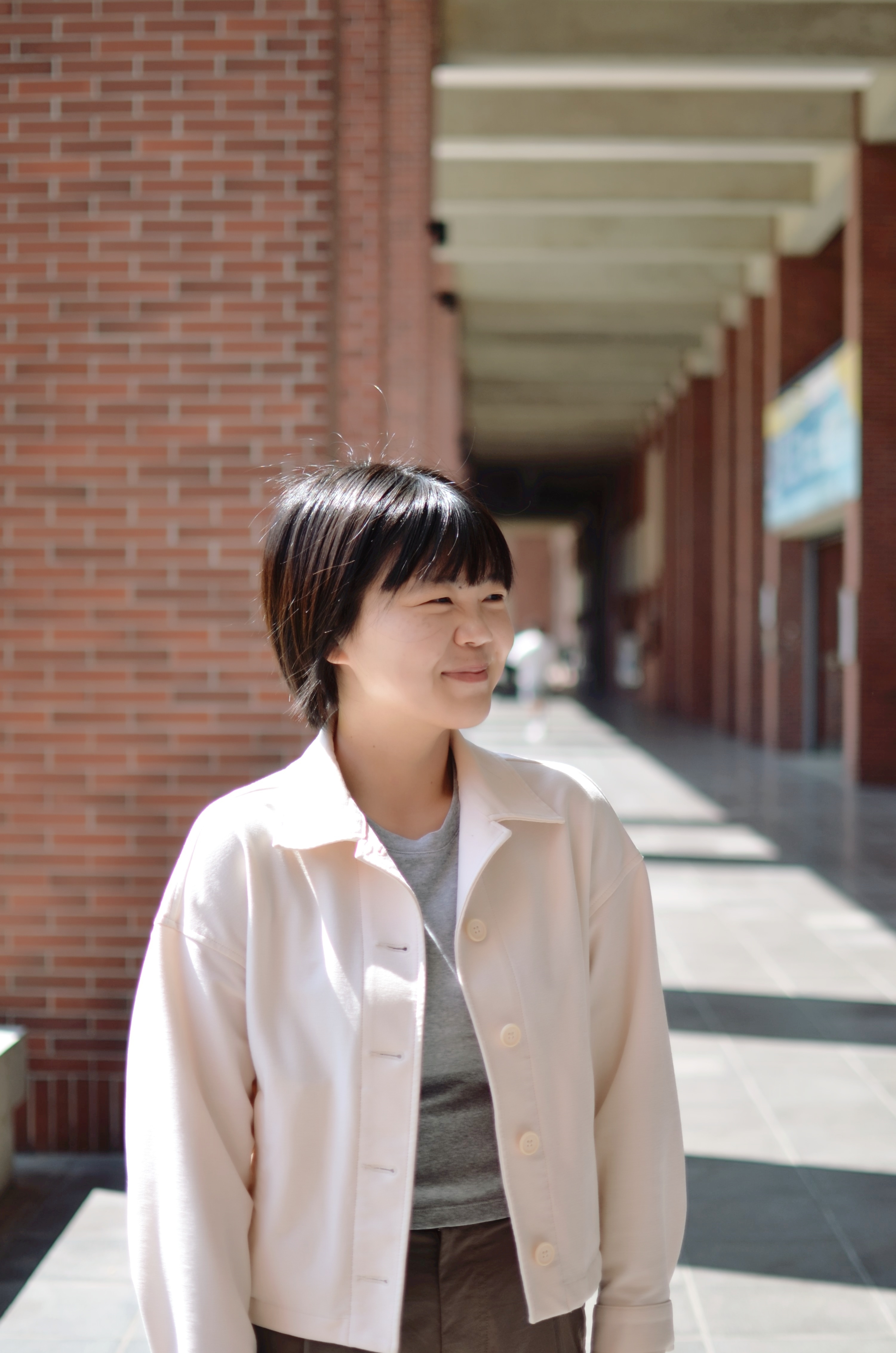
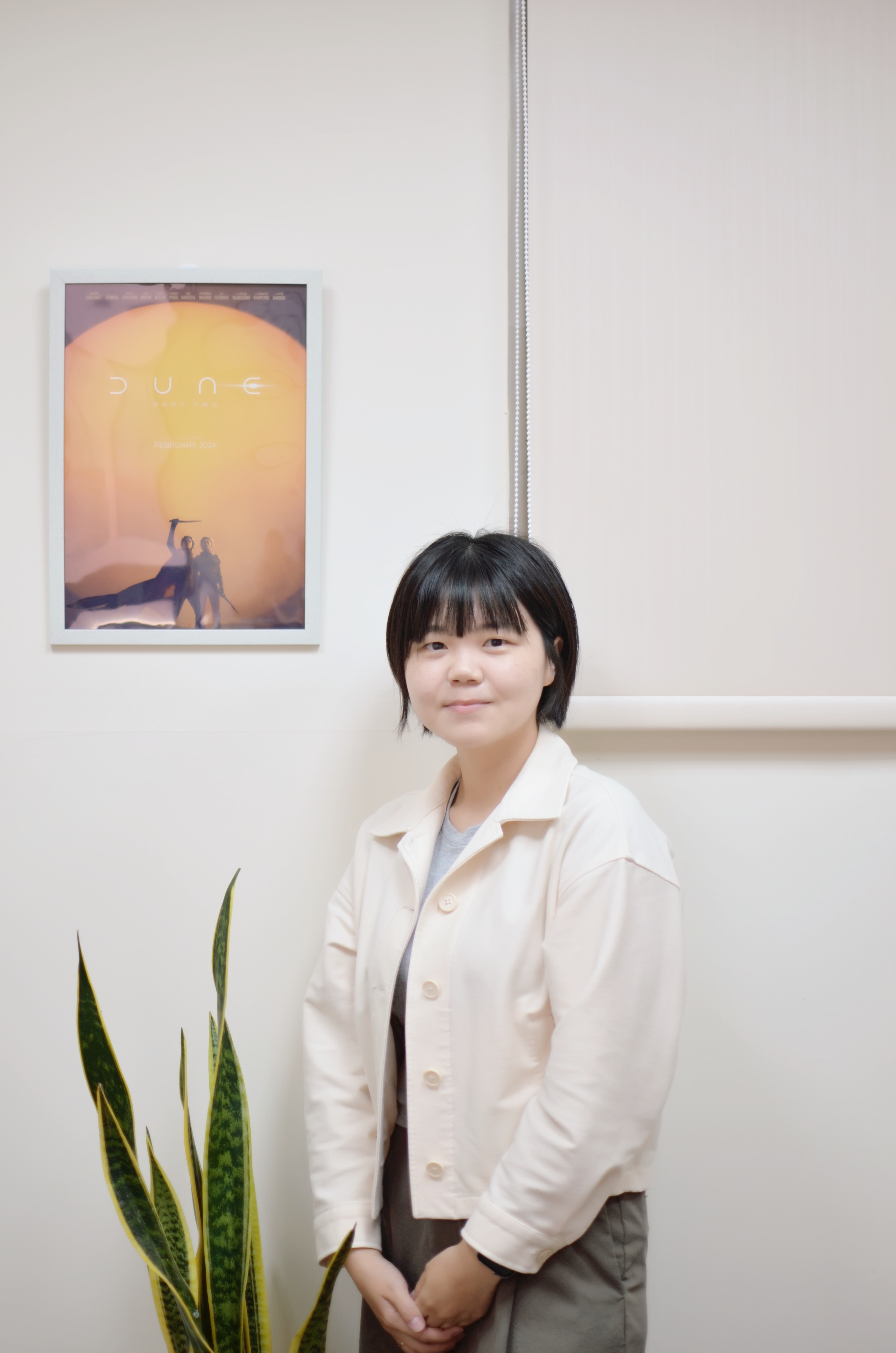
A new faculty member who returned to teach at NSYSU in the spring 2024 semester, Professor Pei-Chi Lo is pictured on the right with the Dune 2 poster in her research lab.
Professor Pei-Chi Lo has a deep relationship with the College of Management of National Sun Yat-sen University. An alumnus of NSYSU’s Department of Information Management, she obtained her PhD in Information Science from Singapore Management University last year. She was hired by NSYSU this semester (spring 2024), and she is an enthusiastic new faculty member, happy to return to serve her alma mater.
Professor Lo returned to NSYSU, this time no longer as a student but as a professor. She said nostalgically, “It's just as relaxing as it used to be, it's a very different experience.”
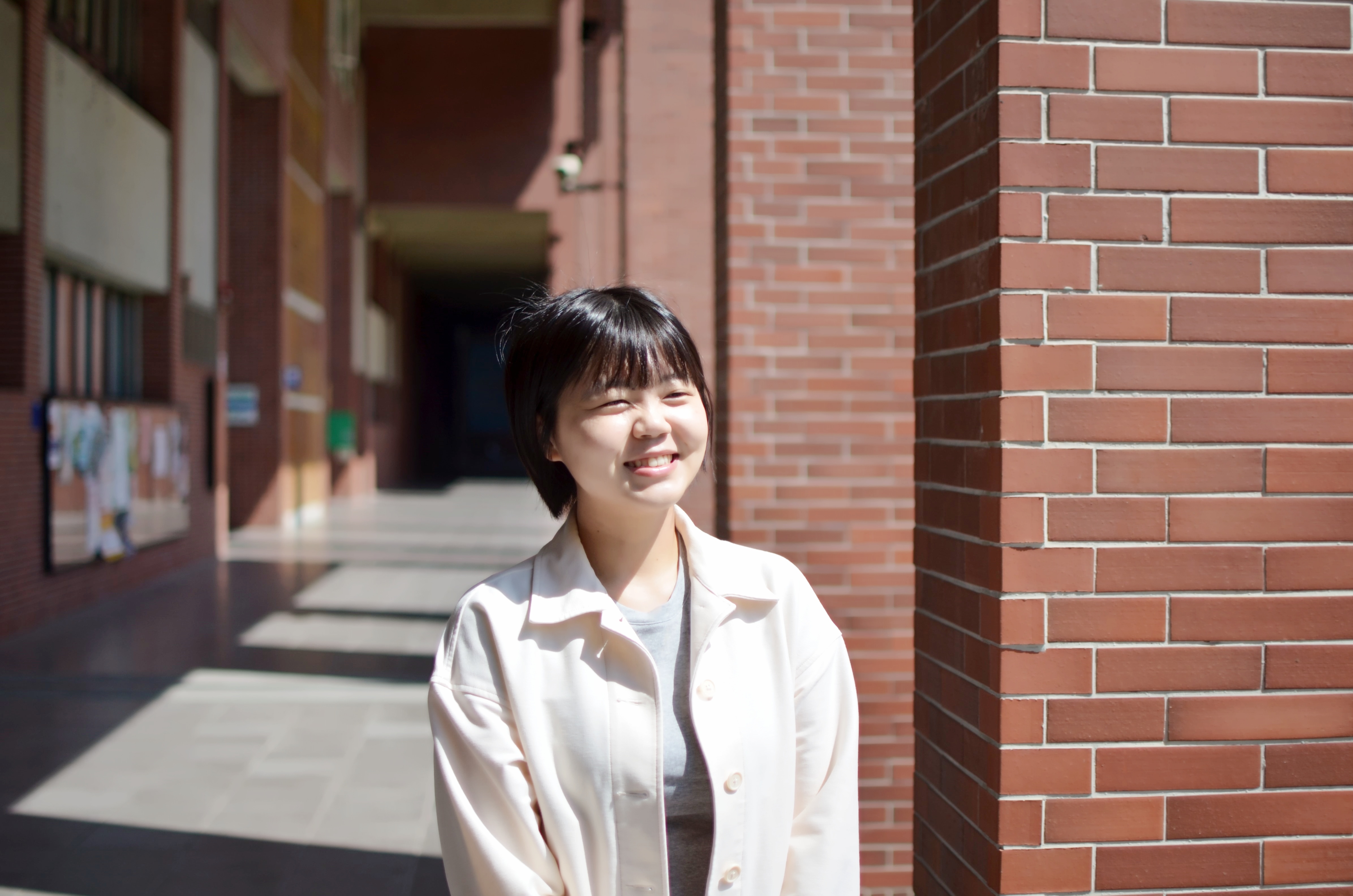
“It's just as relaxing as it used to be, but it's a very different experience,” says Professor Lo nostalgically.
The fact that Professor Lo originally came to NSYSU to study information management has a lot to do with her family background. Although her family was not in the information industry, she loved playing with computers as a child, and she was able to figure out Flash multimedia animation software and DOS systems on her own. “My family used to be very strict, and I couldn’t go out very often, so I explored the Internet and learned from the Internet at home,” said Professor Lo.
NSYSU’s Master’s Degree Program
Taking on projects to connect with the industry
Actually, Professor Lo’s older sister is also an alumnus of NSYSU’s Department of Information Management. At the time, her sister shared her positive “customer experience” of the program, which convinced Professor Lo to follow in her sister’s footsteps.
Three or four years later, she began to prepare for her career path after graduation. Professor Lo originally planned to start working right after graduation, but the university happened to be promoting a five-year joint bachelor’s and master’s degree, so she began taking master’s courses in her senior year in order to obtain her bachelor’s and master’s degrees together.
Even though it requires squeezing two degrees into five years, Professor Lo said that the curriculum is actually just the “harder version” of a bachelor’s degree. If you already have aspirations and have basically completed almost all of your university credits, she highly encourages you to try to see if you can get your bachelor’s and master’s degree in five years in one go.
Professor Pei-Chi Lo’s advisor at the time was Professor San-Yih Hwang of the Department of Information Management. She said, “Professor Hwang is very strict, but he cares a lot about his students, and he will really help you think about the path you want to take in the future.” She was also very active and took on many projects to connect with the industry early in her career.
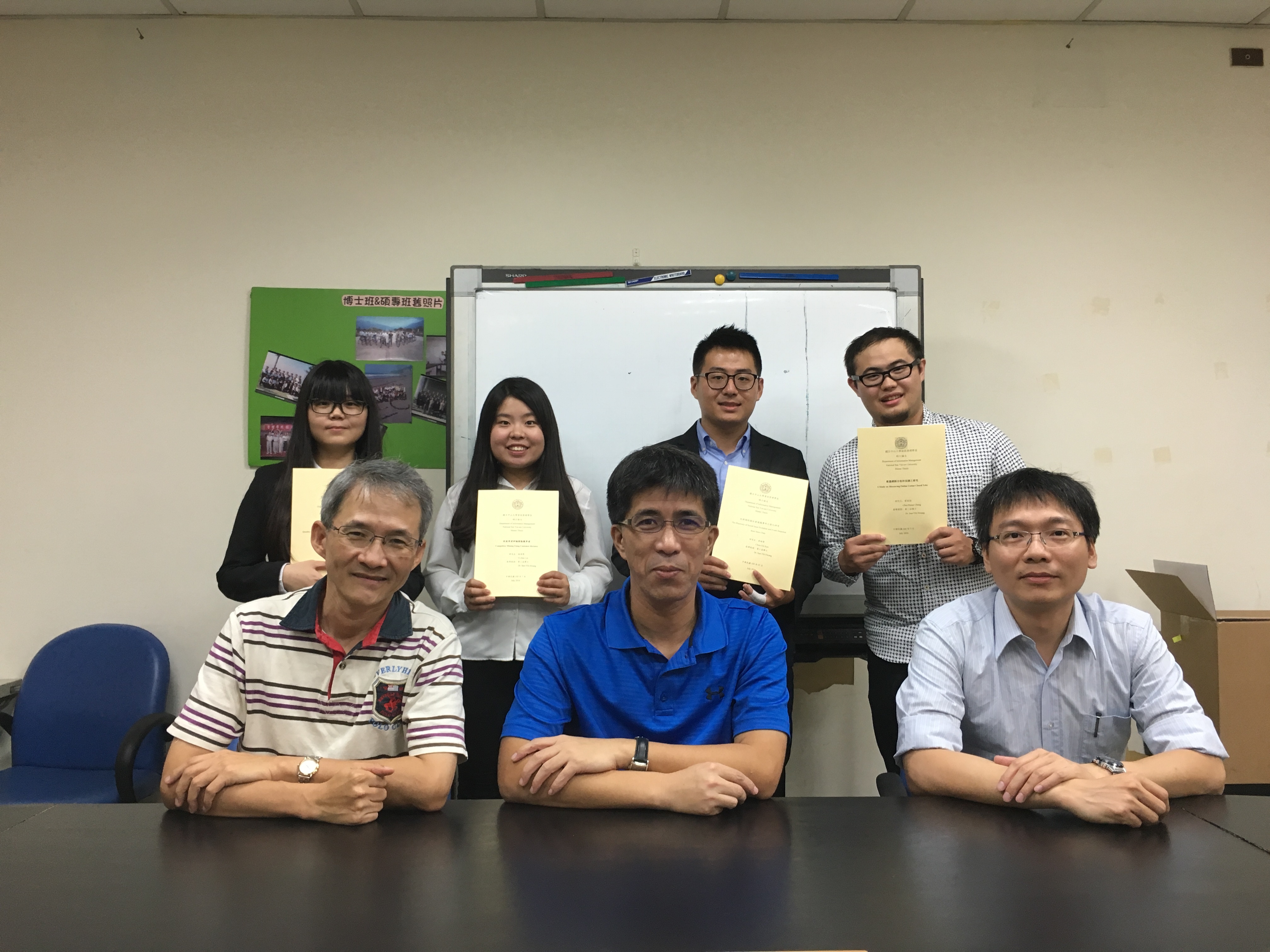
Group photo on the day of her Master’s oral defense. The oral committee members, from left to right, are Professor San-Yih Hwang of NSYSU’s Department of Information Management, Professor Chih-Ping Wei of National Taiwan University’s Department of Information Management, and Professor Yihuang Kang of NSYSU’s Department of Information Management (photo courtesy of Professor Lo).
One of the most memorable projects she was involved in was the academic-industry collaboration with the major global packaging and testing company ASE Holdings and the research lab of Assistant Professor Yi-Ling Lin, who was then working at NSYSU’s Department of Information Management, to develop a text mining system for the company’s internal use. Text mining is a type of data analysis, which (as the name suggests) analyzes text data, transforming unstructured information into structured data and uncovering valuable information. Professor Yi-Ling Lin’s lab was responsible for the front-end interface, while Professor Pei-Chi Lo’s team was responsible for the back-end system.
At the time, Professor Lo and her fellow graduate students often spent all night working on the project together, which made them feel like revolutionaries and also improved their communication skills.
Professor Lo pointed out that many outstanding engineers, despite being full of expertise, are not very good at speaking, which makes them unable to communicate their ideas and also prone to misunderstanding each other. “Therefore, the training of the College of Management is really a great advantage. Management professionals are the bridge that facilitates communication between information and management.”
After Professor Lo graduated from the Master’s program, Professor Yi-Ling Lin recommended she apply for a PhD scholarship to cover her tuition and living expenses, so she decided to continue her education. Professor Hwang suggested she consider Singapore Management University, and she was lucky enough to receive a scholarship from SMU that provided free tuition and a monthly stipend to cover living expenses, enabling her to study abroad as she wished.
Busy Life in as a PhD Student
Major Language and Culture Differences in Singapore
When Professor Pei-Chi Lo arrived in Singapore, she first worked for her advisor, Professor LIM Ee Peng, as a research engineer, working together on an industry-government collaboration project. She officially enrolled as a student six months later.
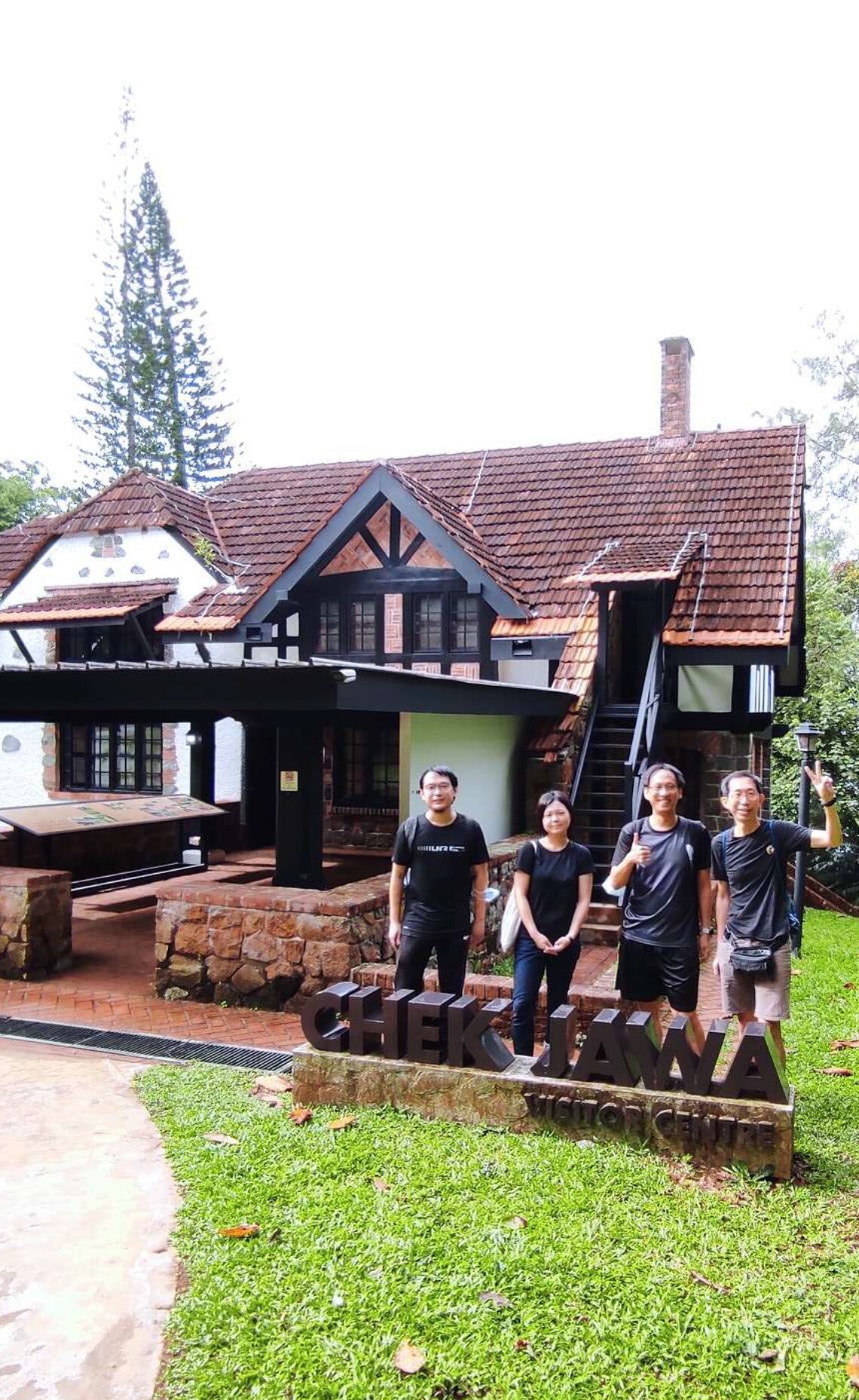
A trip to Ubin, a small island off Singapore, with her doctoral advisor Professor LIM Ee Peng (far right), a Chinese classmate and an Indonesian colleague (photo courtesy of Professor Lo)
"I didn’t expect the first year of the PhD program to be so painful!" recalls Professor Lo. First, because she was a scholarship recipient, she was required to clock in at the university by 8 a.m. every day. Additionally, since the PhD program was combined with a professional course for working students, classes often ran until 10 p.m. This meant that she was at the university for many hours a day, akin to the long hours typical of office workers who must work overtime.
In addition, the pressure of the program’s coursework and projects was very high. In terms of coursework, not only did she have to cope with a full English environment, but the academic difficulty was much greater, and she also had study groups, ERP projects, and TA training. It was incredibly busy and high-pressure.
Even when she wanted to take a break and relax after school, she couldn’t. Professor Lo shared that in Singapore, where prices are extremely high and rents are very expensive, she found a relatively “cheap” apartment with a monthly rent of SGD700 (about NTD20,000), but she had to live with her landlord’s family in order to save money.
Living under someone else’s roof meant she had to make accommodations and adapt to the lifestyle of her landlord’s family. When she returned home tired after a long day, she couldn’t even relax because she had to be in the same space as others.
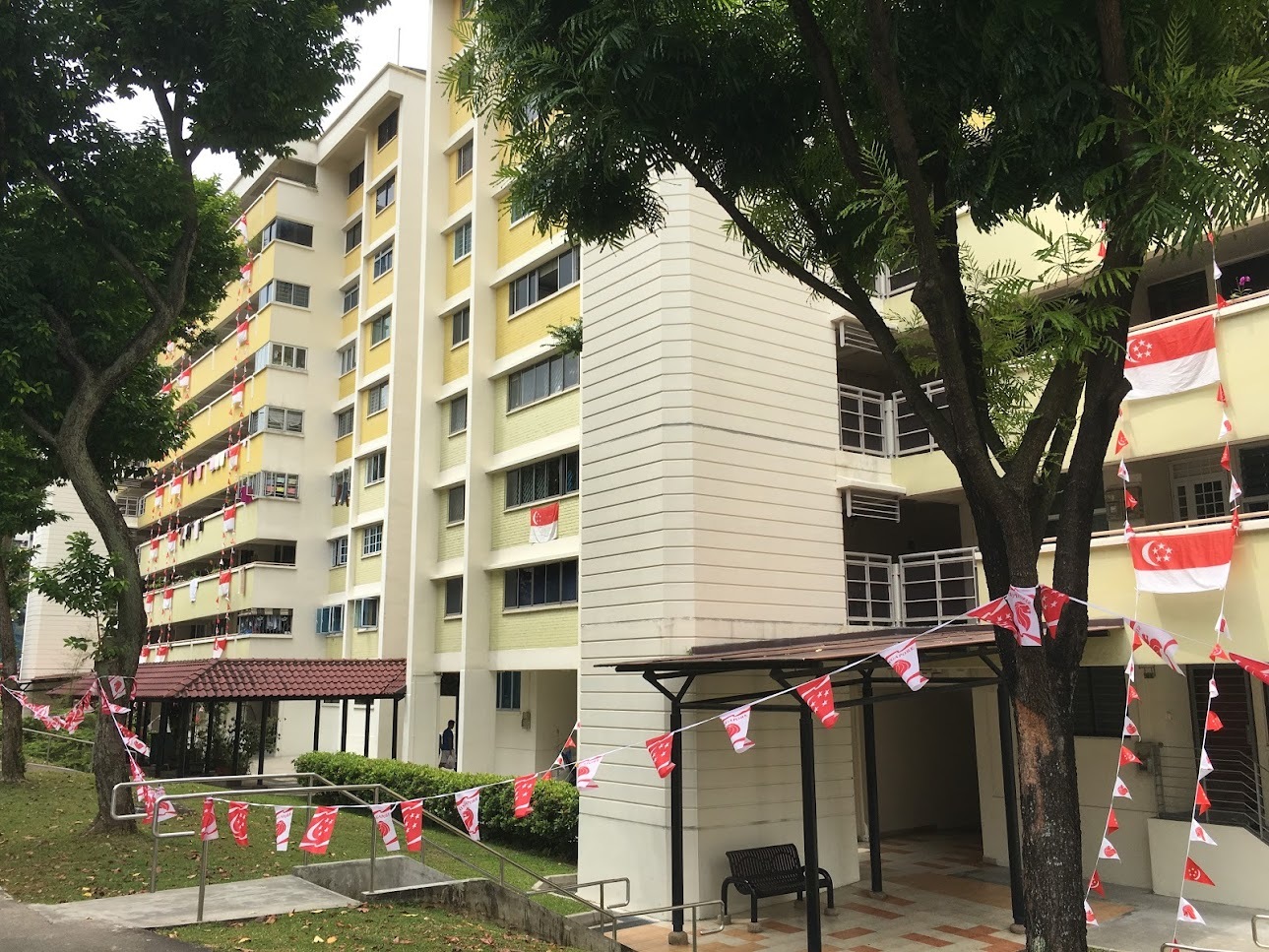
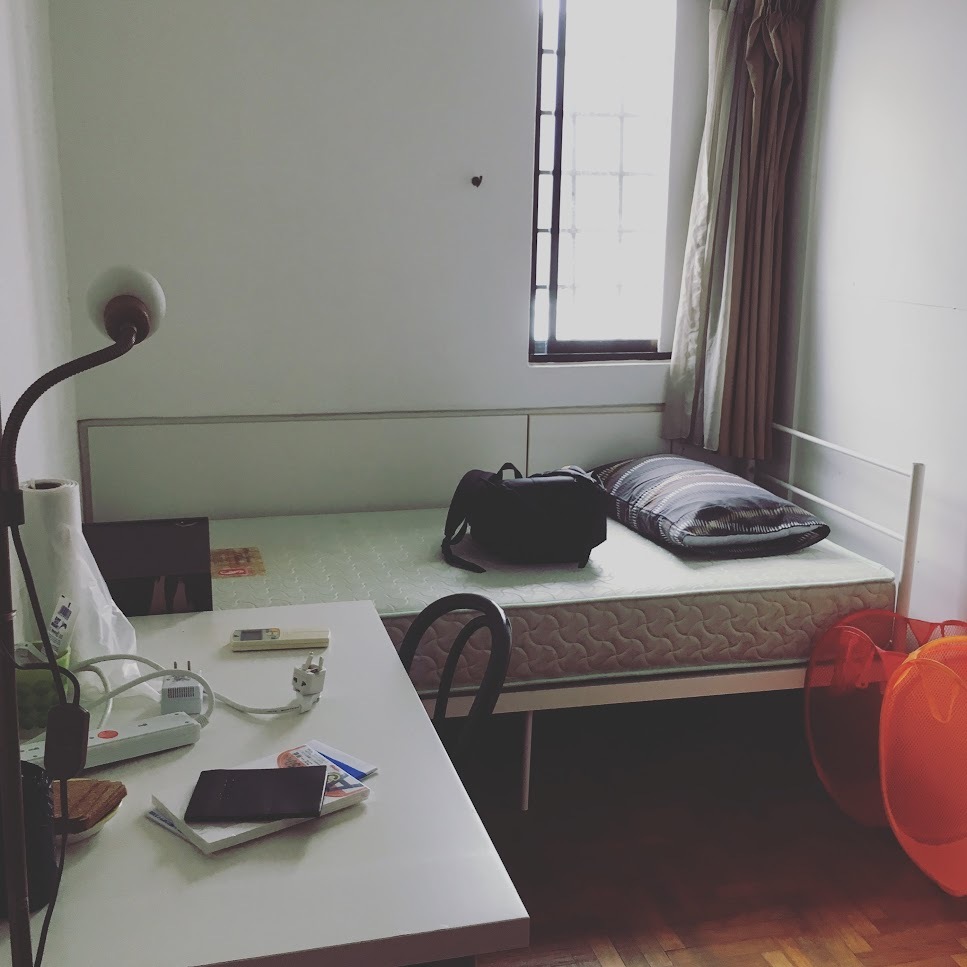
Left: During Singapore National Day, the national flag is hung all over.
Right: Professor Lo’s first place to stay in Singapore, less than three pings for NTD20,000 per month (photos curtesy of Professor Lo).
Interacting with students from different countries also posed a major challenge for Professor Lo, especially in terms of understand different accents. In particular, Singaporeans’ “Singlish” sometimes left Professor Lo guessing. Locals often add a “la” at the end of a sentence, or mix in words from Hokkien, Malay and Hindi. “For example, they often say 'alamak', which is the Malay word for 'Oh my God’.”
Moreover, the cultural differences in verbal expressions were quite noticeable. “For instance, to describe something delicious or great, a classmate might say ‘This is shock!’ instead of ‘delicious.’” However, during formal presentations, everyone would switch back to standard English, which Professor Lo found amusing but was yet another aspect of the linguistic and cultural differences that she needed navigate.
Singapore, known for its international outlook, attracts talents from various countries for education and employment. It also draws professionals from diverse fields, such as life sciences and politics, who come to study data analysis. Professor Lo appreciates this interdisciplinary approach, noting, “Sometimes, insights from different fields can be more valuable than a solely information management perspective, because ultimately, information management needs to be applied across various domains.”
Rise of AI Disrupts Academic Research
Finding the Right Aspiration
Professor Lo’s PhD dissertation is about knowledge graphs, a technology that uses graphical representations to records facts, which is applied to information retrieval to help users understand and discover the connections between people and things. It is most commonly used in search engines to assist users by suggesting the most relevant pages or products based on their keyword searches.
However, she says, “we always knew that AI could do a lot, but after the introduction of ChatGPT, we realized just how much it can do, with such a high accuracy rate.” At first, researchers didn’t expect ChatGPT’s capabilities in interpretation and inference to become so prominent so quickly, making much of the previous research suddenly seem obsolete.
So at the time when AI was suddenly very popular, in fact, everyone was quite confused, she said a bit grimly. “There was student who was going to graduate soon and he was very afraid, because all the research he had done up to that point was suddenly becoming obsolete, and he wasn’t quite sure which direction to go next.”
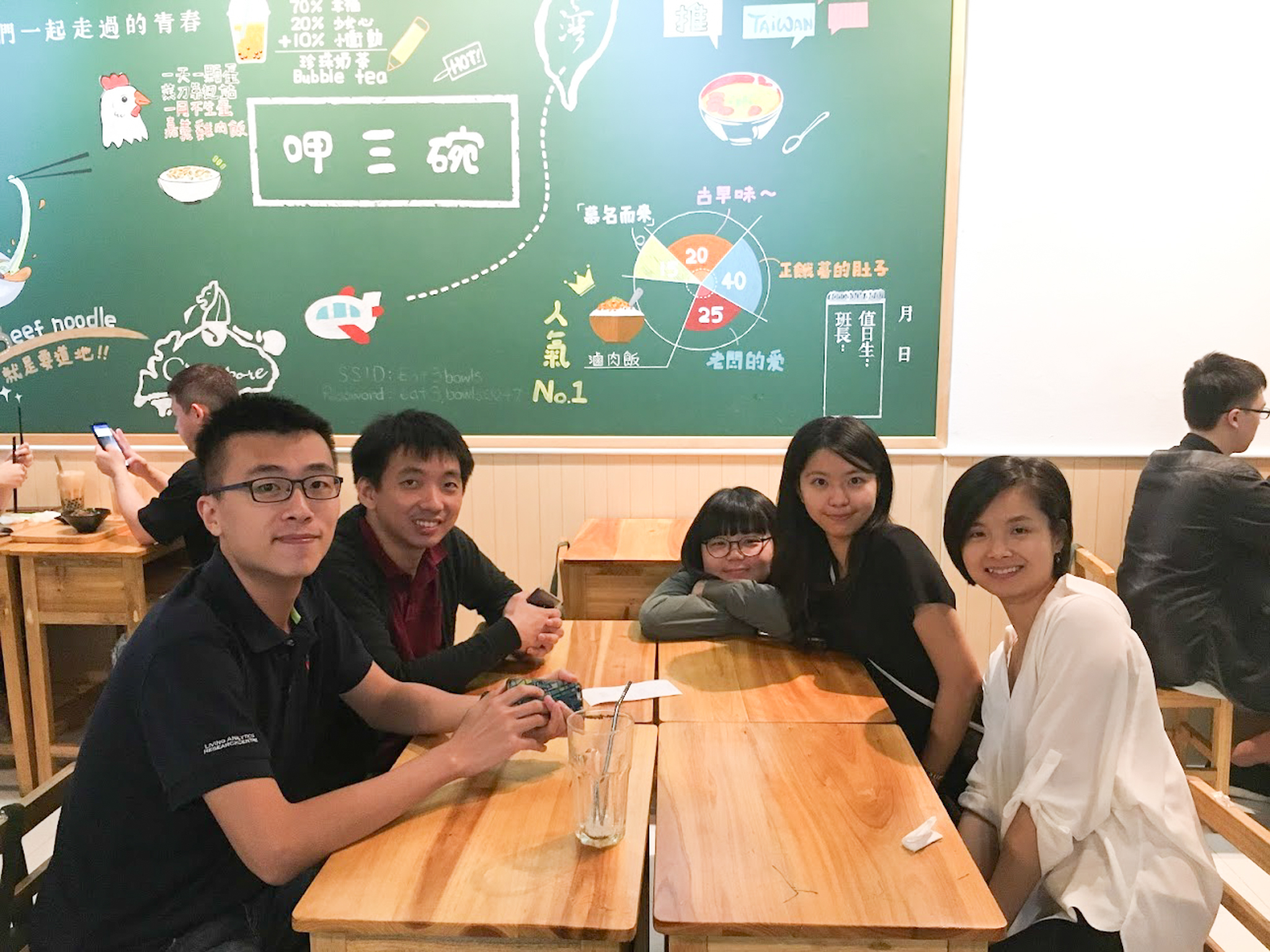
While in Singapore, Professor Lo (third from right) and colleagues from Taiwan and Indonesia visited a Taiwanese restaurant, reminiscing about the tastes of home (photo curtesy of Professor Lo).
Feeling that Students are More Burdened
Enhancing Soft Skills and Competitiveness
Fortunately, the professor found her own direction and came to teach at NSYSU’s College of Management. “I like teaching a lot, and the work style is also freer than the rest of the industry,” Professor Lo said with a smile. When she was invited back to her alma mater to share her experiences of studying abroad, she was recruited by the dean of the department, Dean Jack Shih-Chieh Hsu. She felt honored to be able to gain teaching experience and nurture the younger students of her own alma mater.
Next semester, Professor Pei-Chi Lo plans to teach information retrieval and an introductory computer science course that is required for freshmen. She will also teach “Database Systems Project (I)” and lead students in hands-on projects. For example, she has guided students in collaborating with psychologists from NSYSU’s Counseling and Health Service Division to develop a system to encourage diary writing. Starting with interviewing psychologists, they explored how journaling can help users become more self-aware and understand their emotional states. The university hopes to motivate users and establish a reward mechanism to encourage the habit of diary writing to order to relieve stress and express one’s emotions. Although it is still in the early stages of development, there is hope that this project will aid in fostering students’ mental health and emotional well-being.
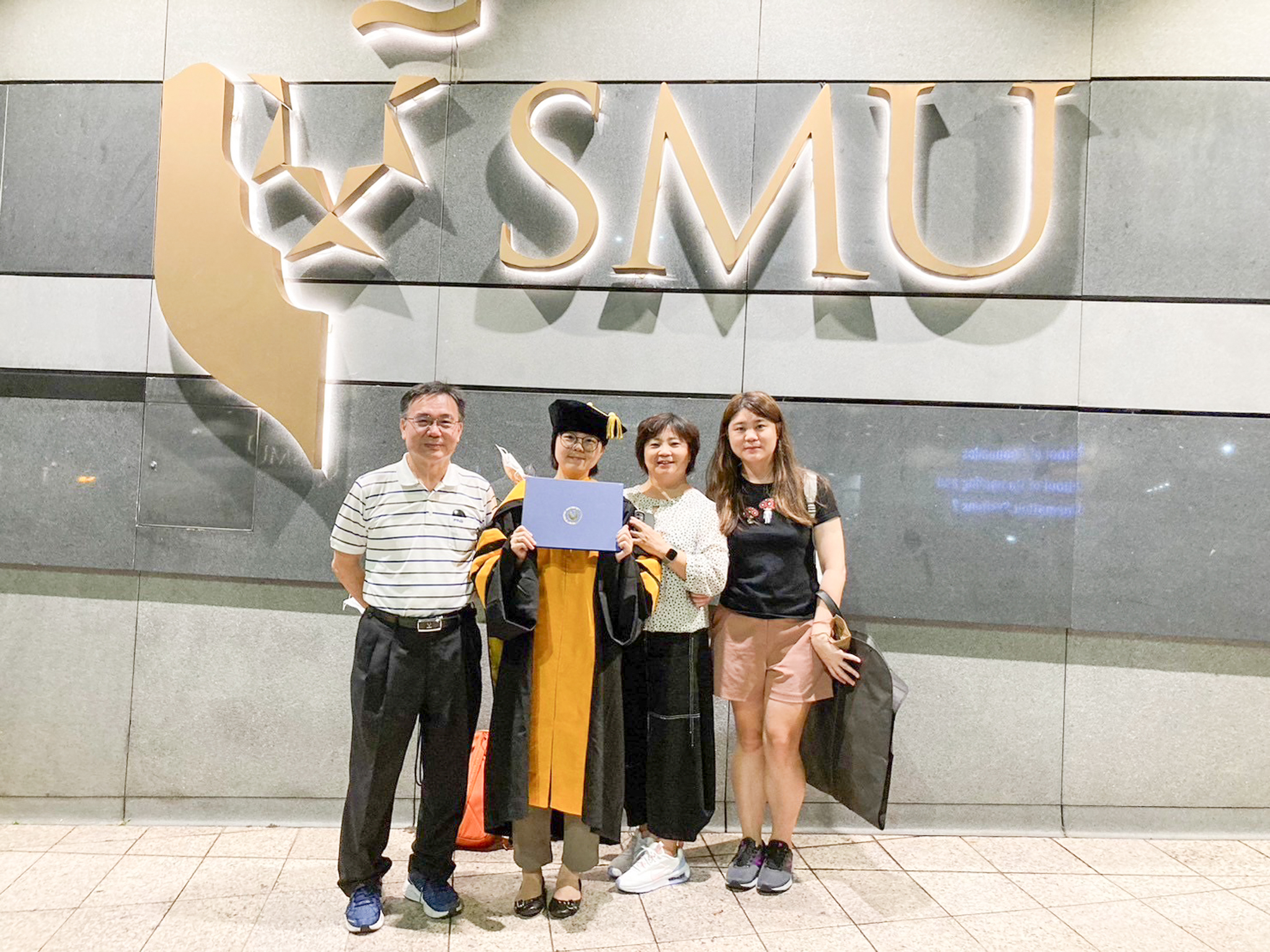
The day she turned 30 happened to be the day of her graduation from her doctoral program. Her family flew to Singapore to attend her graduation (photo courtesy of Professor Lo).
As she returned to her alma mater, her former professors became her colleagues. Professor Lo said she is very grateful that they were willing to share their teaching experiences and give her a lot of guidance. She is also grateful to the department’s administrative staff for being very supportive, assisting with the opening of classes and evaluations, etc.
As for her students, she clearly felt that this generation of students has to carry a greater burden than previous generations. “Resources have become more abundant, and the outside world expects students to be able to do everything.” She also observed that even internships and pursuing graduate school, which used to be a bonus, are now considered basic credentials, “required” for everyone.
How can students be competitive and stand out among their peers? Professor Lo offers a solution: “It's crucial to emphasize what makes you stand out, which often comes down to soft skills like language proficiency and communication abilities.”
Despite the disruptive impact of AI on traditional knowledge, Professor Lo does not believe in discarding previous technologies. Instead, when teaching students, she ensures they understand the historical context—how things evolved, the nature of past issues, and the solutions that have emerged up to the present. This approach helps clarify and solidify how to use contemporary tools effectively to address research questions.
“This is something I’ve come to realize: don’t limit what you can initially achieve," Professor Pei-Chi Lo says, encouragingly. If you start by setting narrow boundaries for yourself, your future possibilities may become more limited. By trying new things and engaging in interdisciplinary learning to broaden your horizons, you open up more pathways for your future.
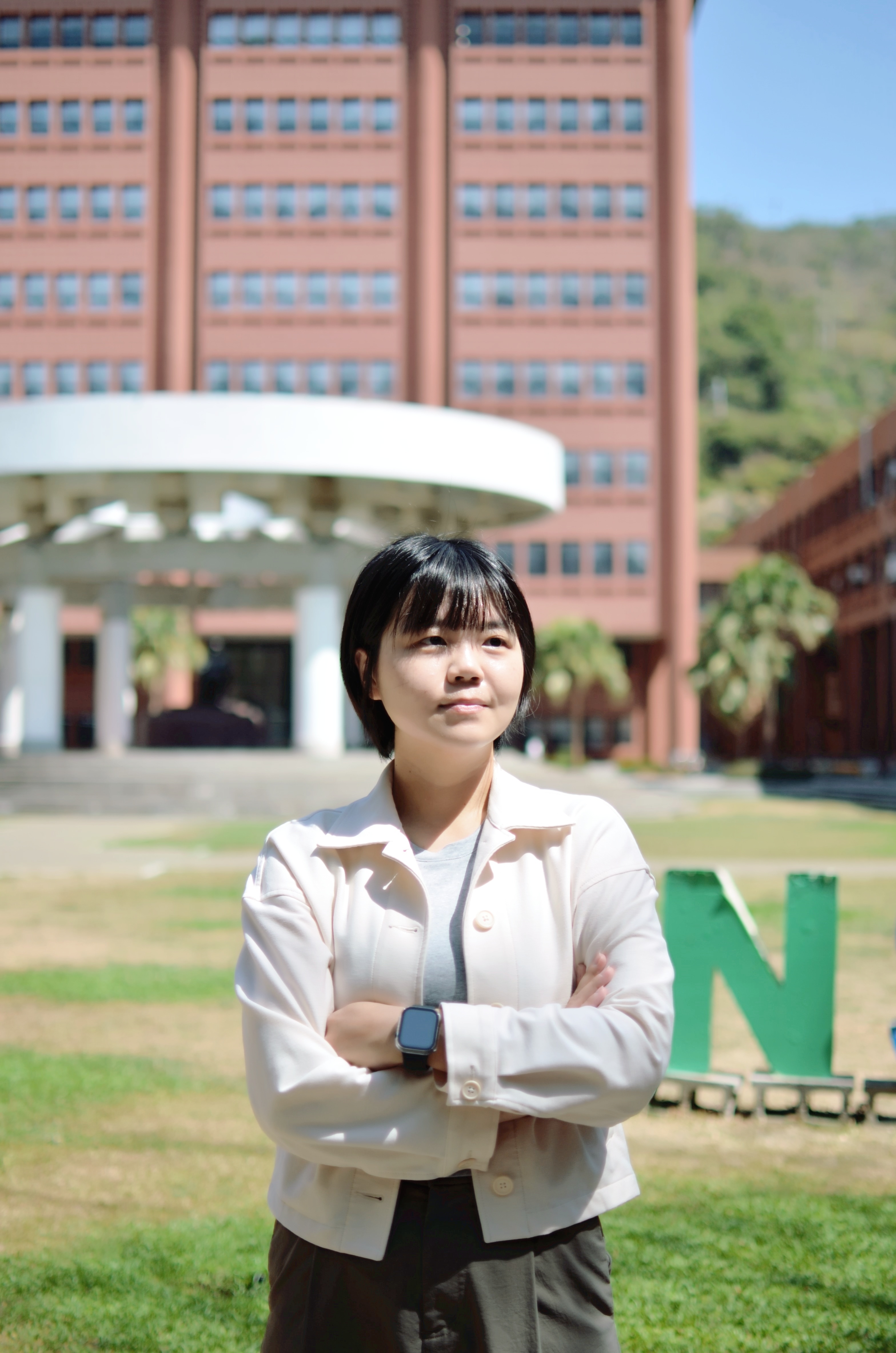
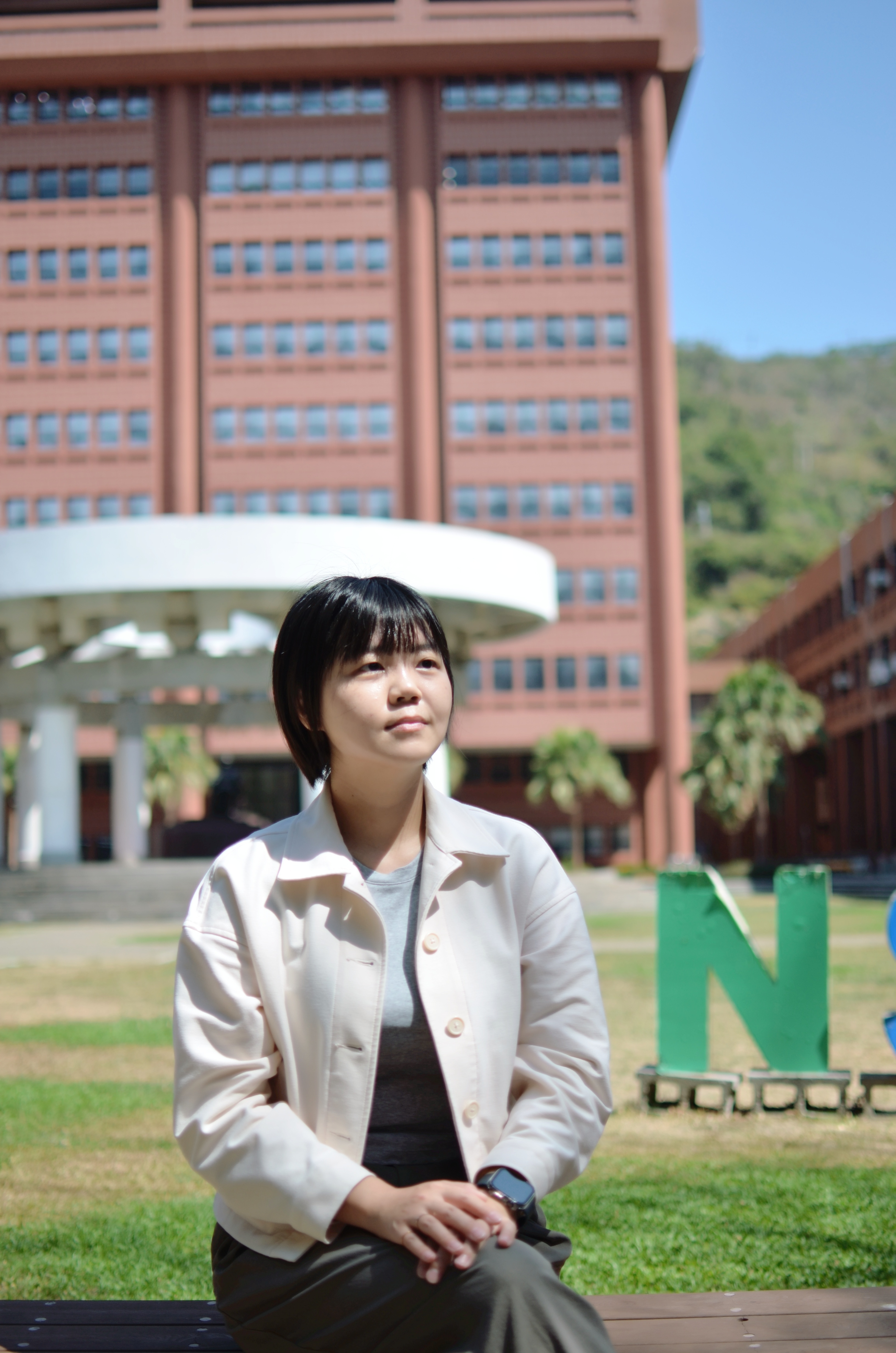
Professor Pei-Chi Lo encourages students to explore broadly and learn across disciplines to expand their perspectives and open up new opportunities in their future career paths.
(Shen Yu, Media, College of Management / Interview Report)




